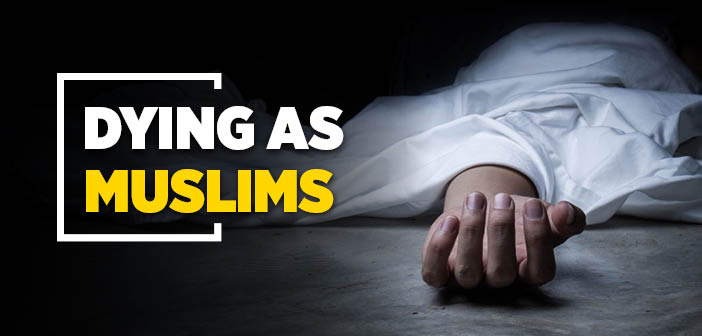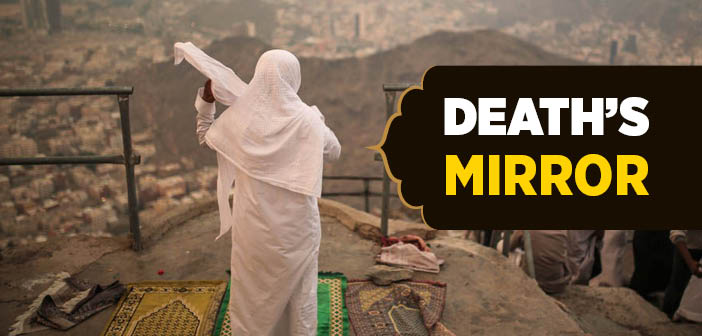What are the mistakes made concering the deceased? What should you not do when someone dies?
The last of the duties of the believers towards each other in this life is to attend the funeral procession of their fellow believer, offer the funeral prayer and to be at their graveside during the burial. Just as this is their final duty towards the deceased, it is also an expression of recognition for the family and loved ones they leave behind.
What befits a Muslim is to be by the side of their fellow believers during their times of difficulty and sorrow, just as much as during their happy times. The funeral is the most painful of these moments of hardship. During funeral processions, hearts become softened in a climate of deep contemplation, pain of separation and sorrow. Those who are able to take lesson from their deceased brothers and sisters find the opportunity to examine their own selves in way of leading the remainder of their lives in much more conscious observance of the divine commands and prohibitions.
Nevertheless, there are certain practices in our day that stand in stark contrast to this otherworldly dimension of the funeral and which do not conform to the Islamic narration. The foremost of these innovations and errors, which stem from either ignorance, heedlessness or the influence of false beliefs or ideologies, can be enumerated as follows:
Sending wreaths to funerals.
Placing the body of the deceased on a catafalque and observing a minute’s silence before it.
Taking the deceased’s body to places where they worked during their lifetime and making speeches beside it.
Providing musical accompaniments to funeral processions.
Keeping the body in a morgue or cold storage when there is no need to do so, because in Islam, it is essential not to keep the body of the deceased waiting and to bury it as soon as possible.
There are many prophetic injunctions in this regard. For instance, when Talha ibn al-Bara’ fell ill and the Messenger of Allah (may Allah bless him and grant him peace) came to inquire about his health, after he left, he said to those who were present, “I see that Talha’s death is imminent. So, inform me (about his death) and make haste (with his funeral), for it is not proper that the dead body of a Muslim should remain with his family.” (Abu Dawud, Jana’iz, 34)
Likewise, the Messenger of Allah (may Allah bless him and grant him peace) once said to ‘Ali (may Allah be well pleased with him) “do not delay three things: Prayer when its time; a funeral when the body of the deceased is ready; and the marriage of an unmarried woman when a suitable match is found.” (Tirmidhi, Salat, 13/171)
It is also wrong to wash the body of the deceased with water that is too cold or hot. The compassion and sensitivity shown to the living must also be shown to the dead, and they should be washed with lukewarm water.
Umm Qays bint Mihsan (may Allah be well pleased with her) narrates:
“My son died, and I was heavily grieved. I said to the person who was washing him, ‘Do not wash my son with cold water, you will kill him.’
‘Ukasha ibn Mihsan (may Allah be well pleased with him) went to the Messenger of Allah (may Allah bless him and grant him peace) and told him what I had said, and he smiled and then said, ‘Is this what she says? May Allah give her long life?'”
The narrator of the Narration then said, “And we do not know of any woman who lived as long as she lived.” (Nasa’i, Jana’iz, 29)
Burying the body in a place other than the place in which the person died is another one of the common mistakes made in our day. The body can only be buried elsewhere if there is no Muslim cemetery in the place where the person died. This is an important consideration, for just as one is careful to be in the company of the righteous during one’s life, care must be taken to ensure that deceased believers are buried among the righteous.
It is not right for women to join the men for the funeral prayer and to go the grave if there is no such necessity.
While the funeral prayer and accompanying the deceased until the burial is commended as meritorious for men, it has not been viewed as favourable for women, being classified in legal terms as, makruh tanzihan.[1] This is because women, who innately have a stronger sense of compassion and mercy, are more likely to display unbefitting behaviour in such painful and distressing circumstances.
One of the female Companions Umm ‘Atiyya (may Allah be well pleased with her) relates:
“We were forbidden to join funeral processions, but it was not made absolutely forbidden on us.” (Bukhari, Jana’iz 29, I’tisam 27; Muslim, Jana’iz, 34-35)
It is discouraged (makruh) for women to form rows for the funeral prayer. Their joining the congregational prayer has been made contingent upon certain conditions. Avoiding male-female contact and interaction, in particular, is the most important condition. In fact, to this end the Messenger of Allah (may Allah bless him and grant him peace) said about one of the doors Prophet’s Mosque:
“Let’s make this door for only women.” The male companions did not use this door again. (Abu Dawud, Salat, 53/571)
In the Two Noble Sanctuaries of Makka and Madina – Masjid al-Haram and Masjid al-Nabawi, however, pilgrims who come there purely for the purpose of worship and seeking the great blessing and benefit of worshiping in these sacred spaces, can offer all prayers, including funeral prayers, in congregation. But they must always comply with the conditions of not adorning themselves, not wearing perfume, avoiding male-female contact, and not giving rise to any indiscretion.
It is also not right to wail after the dead.
As reported by Anas ibn Malik (may Allah be well pleased with him) that the Messenger of Allah (may Allah bless him and grant him peace) passed by a woman who was weeping excessively at a grave and said, “Fear Allah and show fortitude.”
She said, not recognising him, “Leave me alone. You have not been struck by the affliction I have!”
She was later told that it was the Messenger of Allah (may Allah bless him and grant him peace). As soon as she heard this, she rushed to the house of the Messenger (may Allah bless him and grant him peace) and, finding no one guarding the door, she said, “Messenger of Allah, I did not recognise you.”
He said [most compassionately], “True patience is that which is shown at the first blow.” (Bukhari, Jana’iz, 32)
Similarly, the Messenger of Allah (may Allah bless him and grant him peace) says:
“A funeral procession should not be followed by a loud voice or fire.” (Muwatta’, Jana’iz, 13; Abu Dawud, Jana’iz, 46/3171)
Taking grief to extremes and mourning for weeks and months and losing interest in life, does not befit a Muslim.
It is not right to speak ill of the dead, show disloyalty to them or to forget them.
Praying towards the grave or building mosques on graves is also wrong.
It is not appropriate to make elaborate graves and write expressions of excessive praise on gravestones. Such practices contravene Islamic character and the proper courtesy of slavehood. No matter how virtuous the deceased person is, making categorical statements, as though guaranteeing their place in The Garden, should be avoided. The following incident illustrates this point vividly:
Known for his righteousness and asceticism, ‘Uthman ibn Maz’un (may Allah be well pleased with him) died in the house of the Ansar who had given him lodging after his emigration. Umm al-‘Ala’, a woman of the Ansar and the lady of the house, said:
“The Messenger of Allah (may Allah bless him and grant him peace) came to us and I said (addressing the deceased), ‘O Abu As-Sa’ib, I bear witness that Allah, glory be to Him, has honoured you.’
The Messenger of Allah (may Allah bless him and grant him peace) said, ‘How do you know that Allah has honoured him?’
She replied, ‘By Allah, I do not know, may my father and mother be sacrificed for you, O Messenger of Allah!’
The Messenger of Allah (may Allah bless him and grant him peace) said, ‘As for ‘Uthman, the Certain (i.e. death) has come to him, and I hope for him what is best. By Allah, even though I am the Messenger of Allah, I do not know what He will do with me.’
Umm al-‘Ala said, ‘By Allah, I will never again vouch for anyone after him (only hoping for good from my Lord).'” (Bukhari, Tabir, 27)
Having the Qur’an recited for a sum of money during the burial, or afterwards, or to hold mawlid ceremonies for the deceased on certain days and on anniversaries after their death, again in return for payment, and giving feasts, have all been considered bid’a, or innovations. It is hoped that the recitation of the Qur’an on the occasion of one’s death will be meritorious both for the reciter as well as for the deceased. However, arranging for this in return for payment, or for those reading the Qur’an not for the sake of Allah, but for the money, will lose of all the merit and reward.
Falling out with one’s family and relatives because of inheritance disputes and personal greed and ambition is also unacceptable. The believers should divide up inheritance in the manner decreed by Allah and should not give rise to anything that will weaken or jeopardise the bonds of kinship.
Unfortunately, in our day, as people have grown distant from Islam, anger and resentment among relatives has become commonplace.
However, severe Divine sanctions have been prescribed for those who do not comply with these injunctions. While many issues are explained in the Qur’an more generally, the division of inheritance is clearly elucidated in detail and in the plainest terms.[2] It is declared:
“These are Allah’s limits. As for those who obey Allah and His Messenger, we will admit them into Gardens with rivers flowing under them, remaining in them timelessly, for ever. That is the Great Victory. As for him who disobeys Allah and His Messenger and oversteps His limits, We will admit him into a Fire, to remain in it timelessly, for ever. He will have a humiliating punishment.” (An-Nisa, 4:13-14)
There is no basis or indication in the Qur’an or in the prophetic narration concerning the arrangement of mawlid or Qur’anic recitation ceremonies for the deceased, on certain nights, such as the seventh, fortieth or fifty-second days after their death.
Seeking forgiveness for a deceased believer and giving charity and reciting the Qur’an in their name is something that needs to be done all the time. Restricting this to set days leads to the deceased being remembered less on other days. From another standpoint, those who do not have knowledge will suppose that such events are part of Islamic belief and practice.
[1] Makruh: acts which, while they are not considered categorically forbidden, are permissible only in extenuating circumstances, and must normally be refrained from. Makruh tanzihan are reporachful acts that are nearer to permissible (halal).
[2] See 4:11-12.
Source: Osman Nuri Topbaş , Journey To Eternity, Erkam Publications





